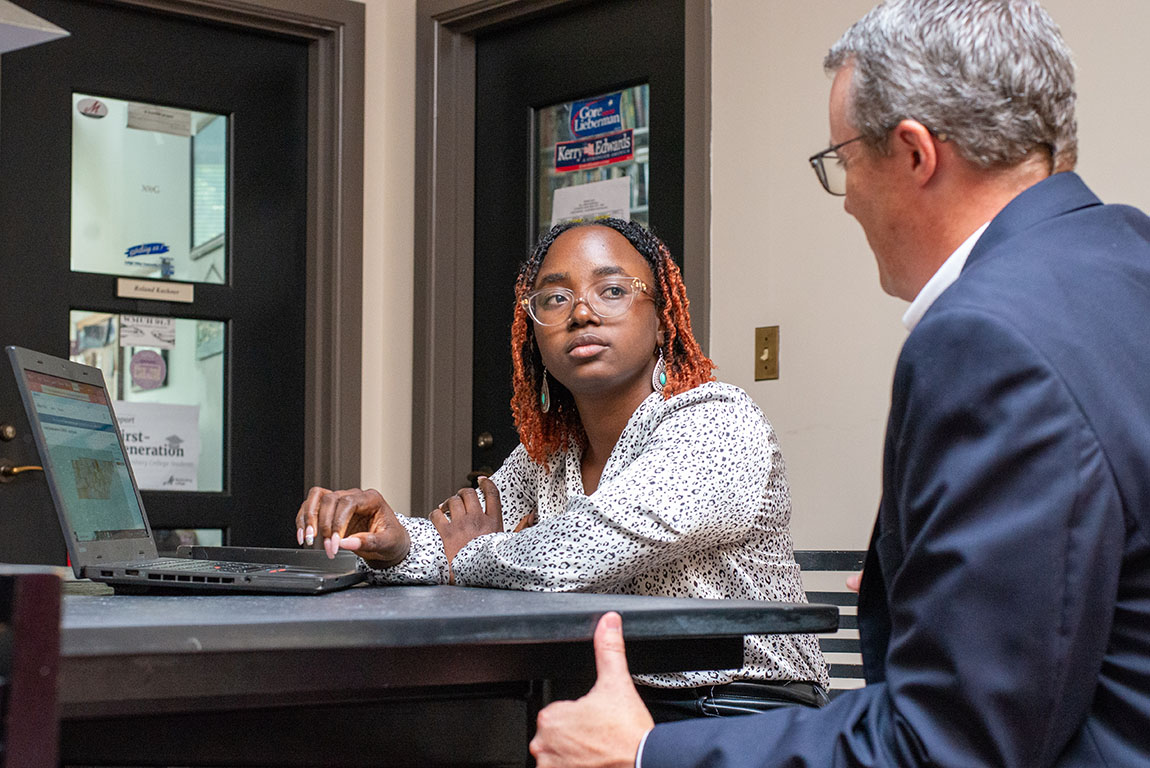Rising Senior Makes Connections Between Quantitative Business and Nonprofit Data and Pandemic Trends
Jenny Maxwell ’24, a business administration major, is conducting summer research on the effects of COVID-19 rates and mitigation measures during the early portions of the pandemic.By: Meghan Kita Monday, August 7, 2023 10:23 AM
 Jenny Maxwell ’24 and Assistant Professor of Business Greg Collins. Photo by Lizard Foley ’24
Jenny Maxwell ’24 and Assistant Professor of Business Greg Collins. Photo by Lizard Foley ’24One reason Jenny Maxwell ’24 wanted to do summer research on how COVID-19 rates and mitigation measures affected businesses and nonprofits is because of how deeply the pandemic affected her own experience. She came to Muhlenberg from Liberia in August 2020, when only first-year students and a handful of others were allowed on campus and when courses were taking place remotely.
“It was a very challenging time, cultural-wise, academic-wise, even mental-wise,” says Maxwell, who’s a business administration major. “The effect it had on me, as an individual and international student here, made me interested in how it affected businesses.”
Assistant Professor of Business Greg Collins also inspired Maxwell’s project: This spring, he asked her to assist on his own research examining the effects of school consolidation — that is, the merging of two or more school districts — on businesses in Arkansas. That experience taught Maxwell the skills she needed to embark on this project (using tools like R, Tableau, QGIS and Excel, for example) and familiarized her with the large datasets available through the U.S. Census Bureau, which is one of the data sources she’s using this summer.
Those data sets quantify factors like number of businesses in a county, number of employees and annual payroll. Maxwell is also working with data from other sources about nonprofits and about COVID-19 rates and mitigation measures (such as school closures, business closures and mask mandates). To make her project manageable, she is limiting her analysis to six states (Pennsylvania, New York, Delaware, New Jersey, West Virginia and Ohio), selected for their close proximity and for their variation in responses to the pandemic.
“[My research experience has] been very eye-opening, because I go to look for one thing and then I see other things that could possibly be important to this research … The more you find answers, the more questions you have,” says Maxwell, who intends to someday apply her research skills to tackle complex problems and contribute to projects addressing pressing global issues. “I’m learning that I actually like doing research, which is not something I was looking at doing in the future. I would like to do graduate research. That’s something I’ve learned through this process about myself. It’s intense, but I love it.”
